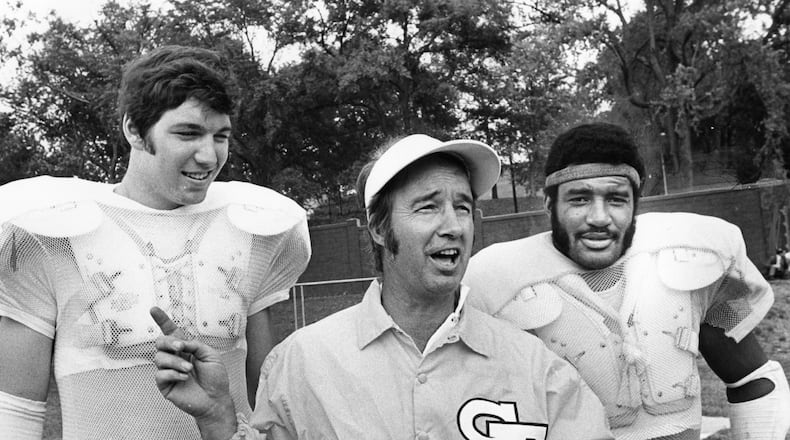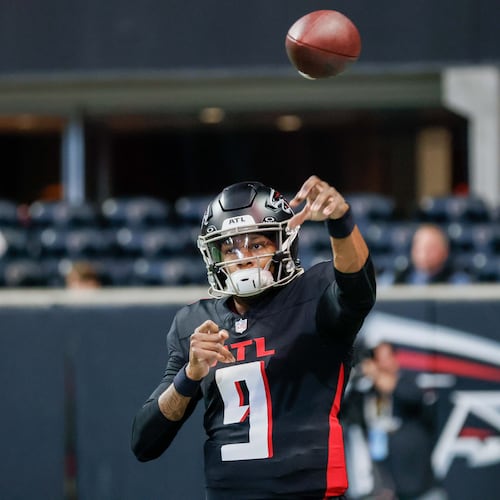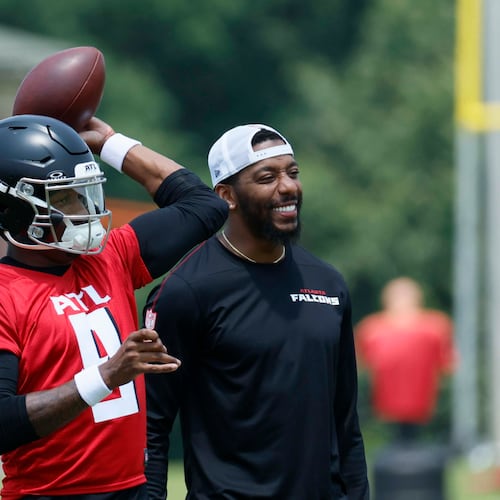Arthur Smith has long been enamored by the history of football.
And the person who first instilled that love of the game’s lore was none other than Atlanta native Pepper Rodgers, the former Georgia Tech quarterback who then enjoyed a near three-decade coaching career. The connection first began in Memphis, Tennessee, Smith’s birthplace and home to his parents. His father Fred Smith, the founder and CEO of FedEx, became friends with Rodgers, who coached the USFL’s Memphis Showboats from 1984-85.
The Smiths were so fond of Rodgers that when FedEx sponsored the Orange Bowl from 1989-2010, he was invited to attend the first game with the family. That immediately became a tradition between the parties.
“He then went to every other FedEx Orange Bowl,” Fred Smith said. “We then spent New Year’s Eve as a family. We would bring several hundred FedEx customers. We had a big event, tailgate outside the stadium.”
And in the process, Rodgers would tell a young Arthur Smith about his playing and coaching days, with the then-child hanging on to each of the words of his stories.
“If anybody talked to him or knew him, he was a great storyteller,” Arthur Smith said. “I’ve always been fascinated by great storytellers. He was a character. I love listening to him. Maybe there’s a nostalgia to it just thinking back on it.”
As a kid, Arthur had a chance to meet a lot of former football players when his family would attend the Orange Bowl. To ensure he was ready for any conversation, he researched all there was to know about each of the former greats he would encounter. Fred said there were times Arthur would recite some statistics the former players were unaware of.
“He would know more about their careers than they would,” Fred said. “They had forgotten. He was just a savant when it came to football.”
The fact that Arthur is now a coach in Rodgers’ birthplace isn’t lost on him. When Arthur met with reporters for the first time as the Falcons’ new coach, he opened by noting this significance because of his family’s relationship with Rodgers.
When Arthur was a standout offensive lineman in high school at Georgetown Prep in Bethesda, Maryland, his coach Dan Paro, who still leads the program, lauded his background knowledge of the game. He noted that it wasn’t just X’s and O‘s that Arthur studied. He made sure to know about those before him and how they affected the game’s landscape.
That particular trait came from being a good listener, Paro said, with the origin beginning with Rodgers.
“No one respects the great game of football more than Arthur,” Paro said.
Rodgers proved to be a great source for Arthur as a young player. After Rodgers’ playing career finished under coach Bobby Dodd at Georgia Tech from 1951-53 -- which saw Rodgers win an Orange Bowl following the 1951 season and two Sugar Bowls following the 1952 and 1953 seasons -- he bypassed the NFL to finish his degree and work as a student assistant. Rodgers then went into the Air Force, where he was a pilot for five years before becoming an assistant for the academy’s football team in both the 1958 and 1959 seasons.
Following assistant stops at Florida (1960-64) and UCLA (1965-66), Rodgers was hired to coach Kansas in 1967. In his second season in 1968, he led the Jayhawks to a share of the Big Eight conference title. In 1971, he took over the UCLA program for three years before being hired to coach Georgia Tech in 1974.
He spent six seasons at his alma mater before being fired following the 1979 season. After coaching the USFL’s Showboats in the mid-1980s, he came back once more to lead the Memphis Mad Dogs during their only season in the Canadian Football League in 1995. From 2001-04, Rodgers was the vice president of football operations with the Washington Football Team.
Rodgers died at the age of 88 in May in Reston, Virginia, a Washington suburb.
“I had the opportunity to start playing football at 9 years old. I fell in love with the game, it gave me an identity,” Arthur said. “As Pepper was around, we attended a lot of Orange Bowls, which was an unbelievable thing I was able to do growing up. It kind of taught me about the game and my love of the game was built there. And Pepper told me the history of the game and the stories.
“He had a huge impact that got my interest piqued as a player and that ultimately led to me coaching.”
About the Author
Keep Reading
The Latest
Featured



